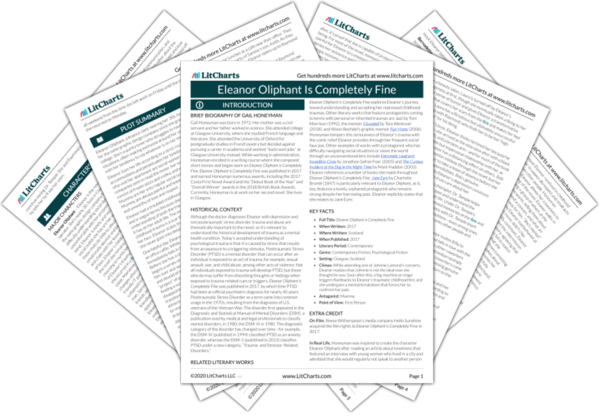Animals symbolize the antithesis of social norms and expectations—areas in which Eleanor feels unnatural and incompetent. Animals are a recurring presence in Eleanor’s offkey thoughts and observations. When Eleanor evokes animals in these types of thoughts, she establishes a divide between the mannerly realm of social norms and her own, unique way of thinking about the world. For example, as she and Raymond walk from the crematorium to the hotel for Sammy’s funeral reception, Eleanor thinks to herself that she’d rather be fed to zoo animals than cremated when she dies. This odd, situationally inappropriate aside is characteristic of Eleanor and her offbeat sense of humor. Here, the presence of animals emphasizes Eleanor’s oddness, but it also directs the reader’s attention to a moment where Eleanor embraces her eccentric personality. Eleanor’s trauma and mental suffering repeatedly obliterate her self-confidence and sense of identity. When she mentions or compares herself to animals, it seems to be a way for her to indirectly assert her strength or presence. For example, Eleanor looks in the mirror, examining her scar, and compares herself to a phoenix, “emerged from the flames.” Usually, Eleanor associates her survival with guilt; in this case, however, she associates survival with the positive possibility of her rebirth.
Animals Quotes in Eleanor Oliphant Is Completely Fine
Should I make myself over from the inside out, or work from the outside in? […] Eventually, I decided to start from the outside and work my way in—that’s what often happens in nature, after all. The shedding of skin, rebirth. Animal, birds and insects can provide such useful insights.
Even the circus freak side of my face—my damaged half—was better than the alternative, which would have meant death by fire. I didn’t burn to ashes. I emerged from the flames like a little phoenix. I ran my fingers over the scar tissue, caressing the contours. I didn’t burn, Mummy, I thought. I walked through the fire and I lived. There are scars on my heart, just as thick, as disfiguring as those on my face. I know they’re there. I hope some undamaged tissue remains, a patch through which love can come in and flow out. I hope.
It isn’t annoying, her need—it isn’t a burden. It’s a privilege. I’m responsible. I chose to put myself in a situation where I’m responsible. Wanting to look after her, a small, dependent, vulnerable creature, is innate, and I don’t even have to think about it.
“Good- bye, Mummy,” I said. The last word. My voice was firm, measured, certain. I wasn’t sad. I was sure. And, underneath it all, like an embryo forming—tiny, so tiny, barely a cluster of cells, the heartbeat as small as the head of a pin, there I was. Eleanor Oliphant. And, just like that, Mummy was gone.












